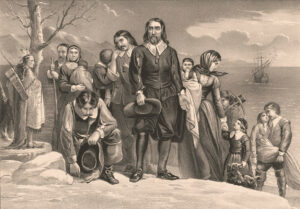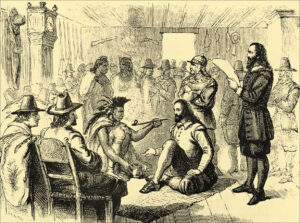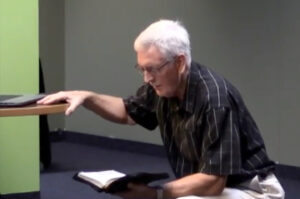
(Public domain.)
By Dr. Don Bierle, FaithSearch President
One hundred and one men, women, and children sailed for sixty-six days across the Atlantic Ocean in 1620. Their first act at Plymouth (Cape Cod, Massachusetts today) when their feet hit the ground was to kneel in prayer.
After one winter in the New World, only fifty-three survived disease and starvation. They celebrated with thanksgiving in the fall of 1621, along with ninety Wampanoag Indians, including their leader and ally, Massasoit.

Fast forward to 1863, when, during a brutal civil war, President Abraham Lincoln declared a national November holiday to “give thanks for general blessings.” One hundred years after that (1963) President John F. Kennedy made a Thanksgiving proclamation with the words, “Over three centuries ago, our forefathers in Virginia and Massachusetts, far from home, in a lonely wilderness set aside a time of Thanksgiving. They gave thanks for their safety, the health of their children, the fertility of their fields, for the love which bound them together and for the faith which united them with their God.”
What a blessing it would be if that was America’s prayer and reality for the spirit of Thanksgiving in 2022! As John Henry Jowett so aptly wrote, “Every virtue divorced from thankfulness is maimed and limps along the spiritual road.”
This Thanksgiving, I hope to enrich your gatherings with an expansive understanding of the biblical components associated with it. These components of thanksgiving are identified in Colossians 3:12-17.
- A spirit of forgiveness is included in thanksgiving (vv. 12-14)
- A spirit of gratitude is included in thanksgiving (v. 15)
- A spirit of praise is included in thanksgiving (v. 16)
- A spirit of testimony is included in thanksgiving (v. 17)
A Spirit of Forgiveness
In a biblical passage emphasizing thanksgiving (Colossians 3:12-17) there are four associated concepts. The first is forgiveness: “Be forbearing with one another, and forgiving, where any of you has cause for complaint: you must forgive as the Lord forgave you” (v. 13 NEB). Literally, the meaning is “good grace.”

Corrie Ten Boon was imprisoned at Ravensbruck concentration camp by the Nazis during World War II for concealing Jews in her Holland home. She survived and began speaking around the world about God’s forgiveness. She was tested on one occasion when a former cruel guard, who had subsequently become a Christian, asked for her forgiveness. This is a selection from her own account:
…I stood there with the coldness clutching my heart. But forgiveness is not an emotion – I knew that, too. Forgiveness is an act of the will… regardless of the temperature of the heart. “Jesus, help me!” I prayed silently. “I can lift my hand. I can do that much. You supply the feeling.” And so woodenly, mechanically, I thrust my hand into the one stretched out to me. And as I did, an incredible thing took place. The current started in my shoulder, raced down my arm, spring into our joined hands. And then this healing warmth seemed to flood my whole being, bringing tears to my eyes. “I forgive you brother!” I cried. “With all my heart!” For a long moment we grasped each other’s hands, the former guard and the former prisoner. I had never known God’s love so intensely as I did then.1
A Spirit of Gratitude
While the entire passage emphasizes thanksgiving, it appropriately identified a heart of “gratitude”: “And let the peace of Christ rule in your hearts…and be thankful” (v. 15). The lack of a thankful heart is the beginning of men’s rebellion against God (Romans 1:21). A heart giving thanks at any given moment is the real test of the extent to which we love God. In my own conversion to faith in Christ, on my knees the first words that I uttered were, “I’m sorry.” The last words I expressed were, “Thank you!”
A Spirit of Praise
The apostle Paul says we should be “admonishing one another with psalms and hymns and spiritual songs, singing with thankfulness in your hearts to God” (Colossians 3:16). The prophet Hosea asked God to take away the people’s sin, “that we may present the fruit of our lips” (14:2). The original Masoretic Text has it “that we may present our lips as bulls” – as in a sacrifice on the altar. David, in Psalm 69:30-31, says that “to praise God’s name in song” will “please the Lord better than [sacrificing] an ox.” The New Testament agrees. The writer of Hebrews (13:15) saying, “…let us continually offer up a sacrifice of praise to God, that is, the fruit of lips that give thanks to His name.”
A Spirit of Testimony
Finally, to testify or witness concerning the Lord is included in thanksgiving. Paul says, “And whatever you do in word or deed, do all in the name of the Lord Jesus” (Colossians 3:17). The Psalmist (96:2-3) also associates testimony with thanksgiving: “Sing to the Lord, bless His name; Proclaim the good news of His salvation from day to day. Tell of His glory among the nations; His wonderful deeds among all the peoples.” The prophetess, Anna, upon seeing the baby Jesus, “began giving thanks to God, and continued to speak of Him to all…” (Luke 2:38).
In conclusion, I agree with Plutarch who wrote, “The worship most acceptable to God comes from a thankful and cheerful heart.” Paul’s letter to the Thessalonians (5:16-18) concurs: “Rejoice always; pray without ceasing; in everything give thanks; for this is God’s will for you in Christ Jesus.”
I pray that you will have a joyous Thanksgiving with a spirit of forgiveness, gratitude, praise, and testimony!
1 Corrie Ten Boom, “I’m Still Learning to Forgive,” Tract 7N01, Westchester, IL: Good News Publishers.



